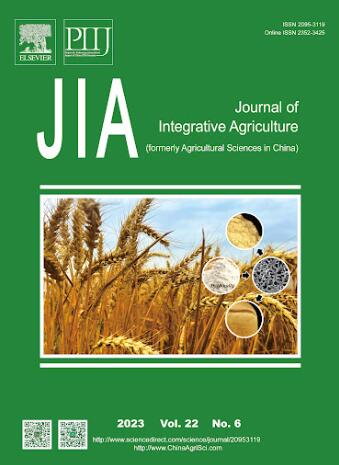The multiple roles of crop structural change in productivity, nutrition and environment in China: A decomposition analysis
IF 4.4
1区 农林科学
Q1 AGRICULTURE, MULTIDISCIPLINARY
引用次数: 0
Abstract
China’s crop structure has undergone significant changes in the last two decades since 2000, with an increase in the share of cereals, vegetables, and fruit, squeezing out other crops. As a result, land productivity, nutrient supply, and carbon emissions have changed. How to reallocate limited farmland among crops to achieve the multiple goals of agrifood systems becomes an important issue. This study explores the sources of land productivity and nutrition supply growth and carbon emissions reduction, and identifies the multiple roles of crop structural change from 2003 to 2020 based on a decomposition analysis. The results reveal that the growth within crops is still the primary driver in land productivity and nutrition supply and the reduction in carbon emissions. However, structural change also plays various roles at different periods. From 2003 to 2010, crop structural change increased the total calorie supply but lowered land productivity and contributed at least 70% of the total growth of carbon emissions. The crop structure was relatively stable, and their effects were modest from 2010 to 2015. From 2015 to 2020, the crop structural change began to play a greater role and generate synergistic effects in improving land productivity, micronutrient supply, and reducing carbon emissions, contributing to approximately a quarter of the growth of land productivity and 30% of total carbon emissions reduction. These results suggest that strategies for crop structural change should comprehensively consider its multiple impacts, aiming to achieve co-benefits while minimizing trade-offs.中国作物结构变化对生产力、营养和环境的多重作用:分解分析
自 2000 年以来的二十年间,中国的作物结构发生了重大变化,谷物、蔬菜和水果的比重增加,挤压了其他作物的比重。因此,土地生产力、养分供应和碳排放都发生了变化。如何在作物间重新分配有限的农田,以实现农粮系统的多重目标,成为一个重要问题。本研究探讨了土地生产率和营养供应增长以及碳减排的来源,并根据分解分析确定了 2003 年至 2020 年作物结构变化的多重作用。研究结果表明,作物内部的增长仍然是土地生产率和营养供给以及碳减排的主要驱动力。然而,结构变化在不同时期也发挥着不同的作用。从 2003 年到 2010 年,作物结构变化增加了总热量供应,但降低了土地生产率,至少占碳排放总增长的 70%。2010 至 2015 年,作物结构相对稳定,影响不大。从 2015 年到 2020 年,作物结构变化开始发挥更大作用,并在提高土地生产率、微量营养素供应和减少碳排放方面产生协同效应,对土地生产率增长的贡献率约为四分之一,对碳排放总量减少的贡献率约为 30%。这些结果表明,作物结构变化战略应全面考虑其多重影响,旨在实现共同利益,同时尽量减少权衡。
本文章由计算机程序翻译,如有差异,请以英文原文为准。
求助全文
约1分钟内获得全文
求助全文
来源期刊

Journal of Integrative Agriculture
AGRICULTURE, MULTIDISCIPLINARY-
CiteScore
7.90
自引率
4.20%
发文量
4817
审稿时长
3-6 weeks
期刊介绍:
Journal of Integrative Agriculture publishes manuscripts in the categories of Commentary, Review, Research Article, Letter and Short Communication, focusing on the core subjects: Crop Genetics & Breeding, Germplasm Resources, Physiology, Biochemistry, Cultivation, Tillage, Plant Protection, Animal Science, Veterinary Science, Soil and Fertilization, Irrigation, Plant Nutrition, Agro-Environment & Ecology, Bio-material and Bio-energy, Food Science, Agricultural Economics and Management, Agricultural Information Science.
 求助内容:
求助内容: 应助结果提醒方式:
应助结果提醒方式:


